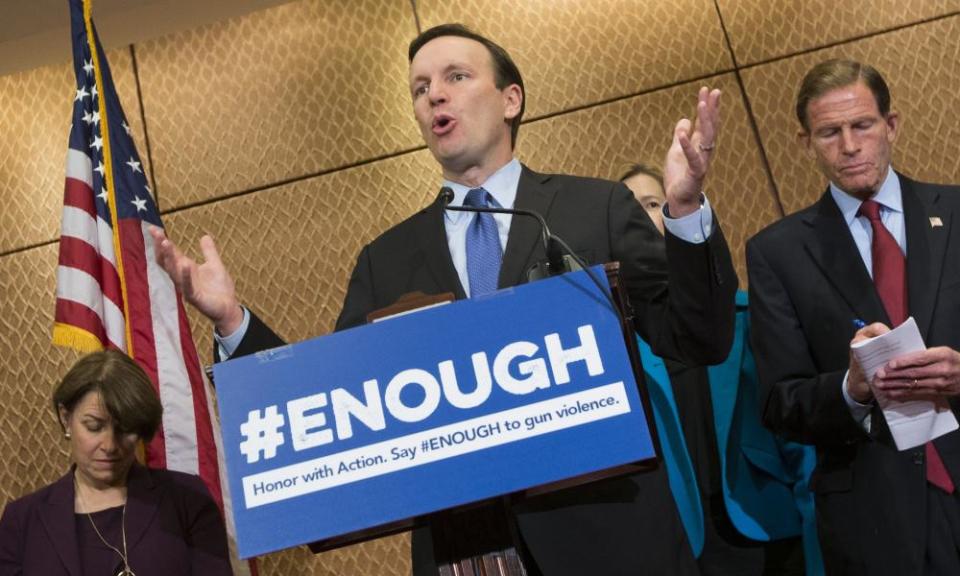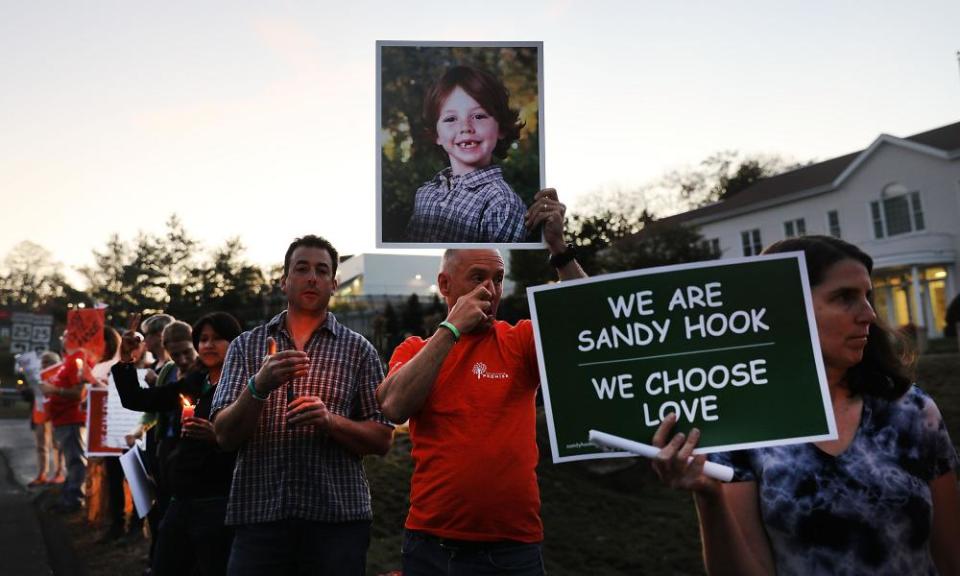Chris Murphy: senator at heart of gun control push senses a change in debate
The Connecticut senator, elected shortly before the Sandy Hook shooting, has continued to lead his cause in the horrific aftermath of the Las Vegas attack

In the hours after the deadliest mass shooting in modern US history, when a man alone in a hotel suite sprayed gunfire on 22,000 concertgoers 32 floors below, leaving 58 dead and injuring almost 500, Senator Chris Murphy rose once again to demand lawmakers do more to prevent these tragedies.
It’s a grim exercise that Murphy has repeated after each mass shooting since he was elected to the Senate in 2012. That was less than a month before 26 people, including 20 children, were killed at Sandy Hook Elementary school in Newtown, Connecticut. As a congressman, Murphy represented the district.
On Tuesday, Murphy stood again behind a lectern, facing a battery of cameras. He condemned congressional inaction in the face of what he called “a uniquely American problem”.
“The reason that these mass shootings continue to happen – the reason that 90 people die every day across this country – is because of public policy choices that this Congress makes,” he said, his voice rising.
“This country has the loosest set of gun laws to allow dangerous people to own dangerous weapons in the industrialized world. And so what is unacceptable in the wake of the most deadly mass shooting in the history of the country is for this utter silence, this unintentional complicity from Congress, to continue.
“I think there is an unintentional endorsement that gets sent to these mass murderers when after slaughter after slaughter, Congress does nothing. If the greatest deliberative body in the world doesn’t do anything to condemn them by policy change, it starts to look like complicity.”
On the morning of 14 December 2012, Murphy was on a train platform in Bridgeport with his wife and young sons, on his way to New York City to see the Rockefeller Christmas Tree. His cellphone rang. A 15-minute drive away, in Newtown, Connecticut, 20 children about the age of his elder son had been murdered.
The newly elected senator was among the first politicians to arrive at a firehouse near the elementary school, where families waited to hear if their child had survived. His phone buzzed repeatedly. The calls were from members of Congress who had consoled constituents in the wake of shootings now seared into the national consciousness: Columbine, Virginia Tech, Tucson, Aurora.
Murphy has said he sometimes wishes he had not been in the firehouse that day. Being there, though, was a personal summons.
“I walked out of that tragedy feeling like I had just been handed my mission in public service,” he told Politico last year. “That if I wasn’t able, in my career in the Senate, to do something meaningful to pay homage to those kids and those teachers, then I had failed.”
Murphy has become one of the Senate’s most vocal and tireless campaigners to impose legislative limits on guns, rededicating himself to the cause after each bloody tragedy.
He dedicated his first floor speech to the issue. In April 2013, four months after Sandy Hook, the Senate voted down a package of gun control measures. The defeat was clarifying for Murphy. If the deaths of 20 children could not alter the political debate in Washington – could anything?

He chose to slog on in a Congress led by Republicans who have long resisted any attempt to impose legislative limits on the second amendment’s guarantee of the right to “bear arms”.
Last year, after a man opened fire in an LGBT nightclub in Orlando, killing 49 people, Murphy led a 15-hour filibuster to demand action on a slate of gun measures. Republican leadership allowed the bills to come up for a vote. The bills included one offered by Murphy to expand background checks and one to ban people on the federal terrorism watch list from buying guns. The Senate deadlocked. The bills failed.
In the days that followed this week’s attack on a country music festival in Las Vegas, Murphy held a press conference on Capitol Hill. He wanted, he said, to challenge Senate Republicans to work with Democrats to find a sliver of common ground. Lawmakers’ indifference amounted to a “quiet endorsement of these continued killings”, he said.
Two days later, the National Rifle Association broke its silence and, in a rare concession, called for “additional regulations” on bump-fire stocks, devices that allow semiautomatic guns to fire like automatics. Though many expressed doubt that banning such rapid-fire devices would be consistent with current law, Murphy saw reason to be optimistic.
“This is the first time in all 10 years that I’ve been in Congress that the NRA has admitted that the laws of the country need to change,” he said, speaking at a rally with gun control advocates in New Haven, Connecticut, on Friday.
“They are fearful for the first time that they are going to lose that fight if it happens in the Congress. Something has changed.”

